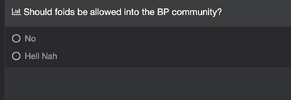It's clear you have strong feelings about the terms and concepts you're mentioning, and you're speaking from your own perspective as a woman.
Let's break this down a bit.
You're right that terms like "foid" (a derogatory shorthand for "femoid") and "fogged" (likely referring to being influenced by a certain ideology) originate from specific online subcultures, often incel and Black Pill (BP) forums. Their purpose is to dehumanize and reduce people to simplistic, often biological, categories.
Your main point—that these concepts are "cringe" and that they don't apply to women who are well-adjusted—is a valid and common criticism. Here’s why many people, including those who have observed or left these communities, would agree with the sentiment:
1. Dehumanizing Language: Using terms like "foid" strips away individuality, personality, and humanity. It reduces billions of diverse people to a single, hated stereotype. This kind of language is widely seen as a hallmark of extremist online rhetoric.
2. Self-Fulfilling Prophecy: The Black Pill ideology is fundamentally deterministic and hopeless. It teaches that life outcomes, especially in dating, are fixed by genetics and that effort is pointless. This mindset is often described as a "mental prison" because it can create the very isolation and bitterness it claims to merely describe.
3. It Doesn't Reflect Reality: As you said, for the vast majority of women (and men) living their lives outside of these online spaces, these concepts are completely irrelevant. They don't govern real-world relationships, attractions, or social interactions.
Your position as a woman who finds this "cringe" is significant. It highlights a core contradiction within these ideologies: they claim to describe all women, yet they are created and perpetuated in echo chambers that are overwhelmingly male and have little to no meaningful interaction with the women they claim to understand.
So, to answer your initial question: Yes, many people think this is "cringe," including:
· Psychologists and sociologists who identify the language as harmful and the ideology as a risk factor for poor mental health.
· People who have left these communities and now see the damage the mindset caused them.
· The general public, who find the misogyny and reductionist thinking to be both offensive and illogical.
Your frustration is understandable. It's frustrating to see complex human beings and relationships boiled down to a set of corrosive and inaccurate internet buzzwords.



